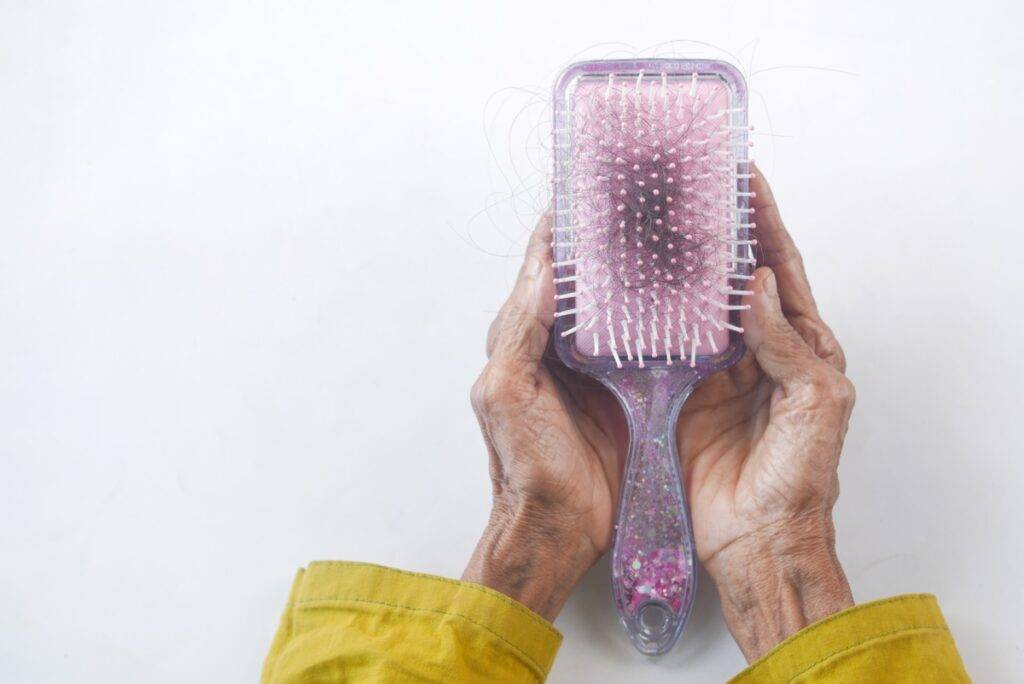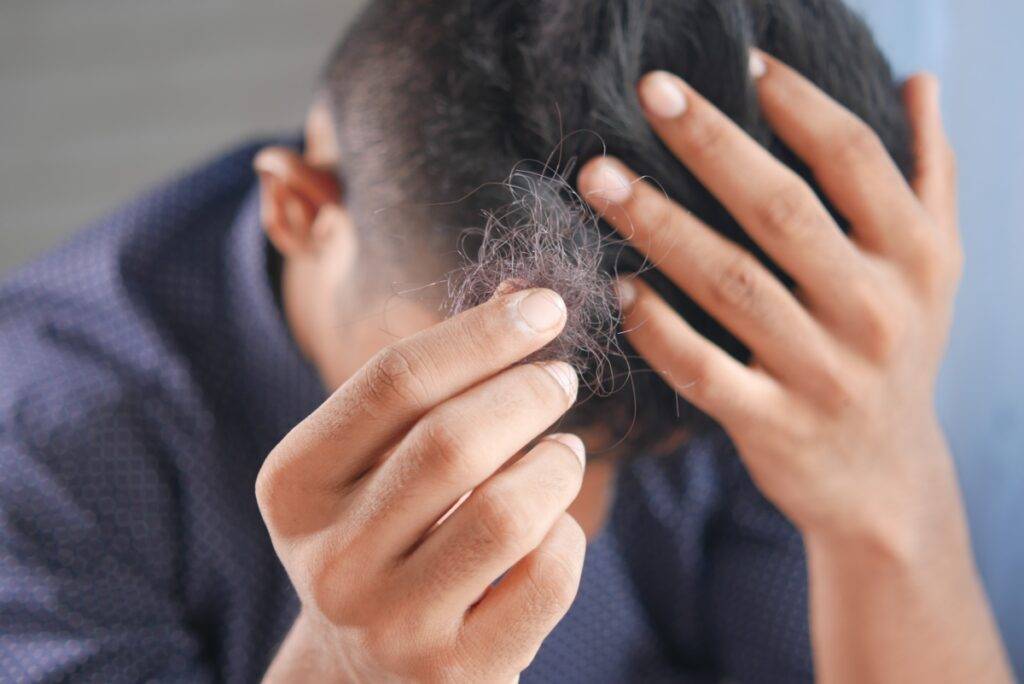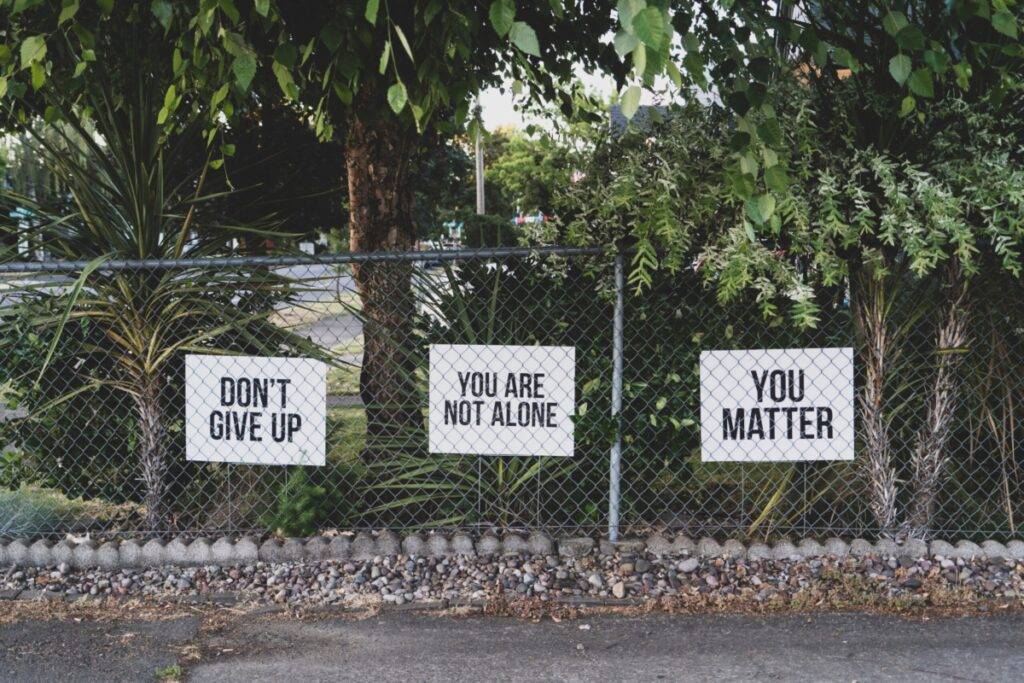Hair loss can be frustrating and concerning, but did you know that it can also be an indicator of a vitamin deficiency? In this complete guide, we’ll explore which vitamin deficiency causes hair loss and how to address the issue. From understanding the role of essential nutrients in hair growth to exploring the best vitamins for combating hair loss, this article has you covered.
Table of Contents
1. Which Vitamin Deficiency Causes Hair Loss?
There are several vitamin deficiencies that cause hair loss. Some of the most common include:
- Vitamin D deficiency: A study found that people with alopecia areata, a condition that causes hair to fall out in small patches, often have low levels of vitamin D. A deficiency in this essential nutrient can contribute to hair loss and poor hair growth.
- Vitamin B12 deficiency: A lack of vitamin B12 can lead to anaemia, which in turn, affects the production of red blood cells. This can impact the delivery of oxygen and nutrients to hair follicles, leading to hair loss. An article from USA Today highlights the importance of B12 in preventing hair loss.
- Iron deficiency: Iron is an essential mineral for hair growth, and a deficiency can lead to hair loss, particularly in females. Iron deficiency can cause hair to become thin and brittle, as well as result in hair loss female vitamin deficiency.
2. Key Vitamins for Hair Growth and Thickness
Now that we’ve addressed which vitamin deficiency causes hair loss, let’s look at some of the best vitamins for hair loss and overall hair health:
- Vitamin A: This vitamin is crucial for cell growth, including hair cells. It also helps the scalp produce sebum, which keeps hair moisturized and healthy.
- Vitamin C: Vitamin C helps the body absorb iron, making it essential for preventing hair loss due to iron deficiency. It also has antioxidant properties that protect hair follicles from damage caused by free radicals.
- Vitamin E: This vitamin is known for its antioxidant properties and helps improve blood circulation in the scalp, promoting hair growth and reducing hair loss.
- Biotin: Also known as vitamin B7, biotin is often recommended as one of the vitamins for thinning hair female. It plays a vital role in the production of keratin, the protein that makes up hair, skin, and nails.
- Niacin: A type of B vitamin, niacin helps nourish hair follicles and promotes healthy hair growth.
- Folic acid: Also known as vitamin B9, folic acid is crucial for cell division and the growth of healthy hair.
For a more comprehensive list of vitamins for hair growth and thickness, visit this article from Lloyds Pharmacy.
3. Diet and Hair Loss in Females
A balanced diet is essential for overall health, and it plays a significant role in preventing hair loss. Diet and hair loss in females are closely connected, as a poor diet can lead to nutrient deficiencies that cause hair loss. To maintain healthy hair, it’s crucial to include the following in your diet:
- Protein: Hair is made of keratin, a type of protein. Consuming adequate protein in your diet is essential for hair growth and preventing hair loss.
- Iron: As mentioned earlier, iron deficiency is a common cause of hair loss. Ensure your diet includes iron-rich foods like spinach, beans, and red meat.
- Zinc: This mineral is vital for hair growth and repair. Foods like oysters, beef, and pumpkin seeds are excellent sources of zinc.
- Omega-3 fatty acids: These essential fats help nourish hair follicles and promote healthy hair growth. You can find omega-3 fatty acids in fish, nuts, and seeds.
- Vitamin-rich fruits and vegetables: Fruits and vegetables are excellent sources of vitamins and minerals that promote hair health. Make sure to include a variety of colourful fruits and vegetables in your diet, such as berries, leafy greens, and bell peppers.
For more information on how to maintain a balanced diet, visit our Understanding Essential Nutrients article.
4. Vitamin D Stopped My Hair Loss: A Case Study
Many people have experienced significant improvements in their hair health after addressing vitamin D deficiency. In this section, we’ll share a case study that demonstrates how vitamin D stopped my hair loss.
Samantha, a 35-year-old woman, experienced hair loss and thinning for several years. After trying various hair treatments and supplements with no success, she decided to consult a healthcare professional. Blood tests revealed that Samantha had a vitamin D deficiency, and her doctor recommended vitamin D supplements to address the issue.
Within a few months of taking vitamin D supplements, Samantha noticed a significant decrease in hair loss and an improvement in her hair’s overall health. This real-life example highlights the importance of addressing vitamin deficiencies in combating hair loss.
For more information on the connection between vitamin D and hair loss, check out this article from the National Center for Biotechnology Information.
5. Can Too Many Vitamins Cause Hair Loss?
While addressing vitamin deficiencies is essential for healthy hair growth, it’s also crucial to be mindful of over-supplementation. So, can too many vitamins cause hair loss? The answer is yes.
Excessive amounts of certain vitamins, like vitamin A and selenium, can lead to hair loss. Overdosing on these nutrients can cause hair follicles to enter a resting phase, leading to hair shedding. It’s important to consult a healthcare professional before starting any vitamin supplement regimen, especially if you’re experiencing hair loss.
For a detailed discussion on this topic, refer to this article from Hims.
6. The Role of Red Blood Cells in Hair Growth
One factor that answers the question of which vitamin deficiency causes hair loss is the role of red blood cells in hair growth. Red blood cells are responsible for delivering oxygen and nutrients to the hair follicles, promoting growth and overall hair health. Vitamin deficiencies, such as vitamin B12 and iron, can impact red blood cell production, leading to hair loss.
Understanding which vitamin deficiency causes hair loss is vital in addressing hair health concerns. For instance, a lack of vitamin D can also lead to hair loss, as it plays a crucial role in maintaining hair follicle function. Moreover, biotin deficiency, though rare, has been linked to hair loss as well. It is crucial to identify and rectify any vitamin deficiencies to ensure healthy hair growth. By pinpointing which vitamin deficiency causes hair loss in your particular case, you can take appropriate steps to replenish the necessary nutrients and prevent further hair loss, ultimately promoting strong and healthy hair.
7. Common Symptoms of Vitamin Deficiency Hair Loss
When exploring which vitamin deficiency causes hair loss, it’s essential to be aware of common symptoms associated with vitamin deficiencies. Symptoms may include sudden or gradual hair loss, hair thinning, brittle hair, or even changes in hair colour. If you suspect that a vitamin deficiency is causing your hair loss, consult a healthcare professional for guidance.
In addition to determining which vitamin deficiency causes hair loss, it’s crucial to recognize the various factors that can exacerbate hair loss issues. Factors such as stress, hormonal imbalances, and certain medications can contribute to hair loss, making it even more challenging to pinpoint the exact cause. By focusing on addressing which vitamin deficiency causes hair loss alongside managing other contributing factors, you can create a comprehensive approach to hair care that tackles the problem from multiple angles. This holistic approach will provide the best chance at restoring your hair’s health and preventing further hair loss.
8. Effective Hair Care Tips for Thinning Hair
While addressing which vitamin deficiency causes hair loss is crucial, it’s also essential to follow effective hair care tips for thinning hair. These include gentle brushing, avoiding heat styling tools, using sulfate-free shampoos, and keeping your scalp clean and healthy. Additionally, maintain a balanced diet and consider taking supplements to address any vitamin deficiencies that could be causing hair loss.
Beyond identifying which vitamin deficiency causes hair loss, incorporating a hair care routine tailored to your specific hair type can significantly impact your hair’s health. By understanding your hair’s unique needs and adjusting your hair care routine accordingly, you can address the root causes of hair loss, including vitamin deficiencies. It is vital to take a proactive approach to hair care and continuously monitor your progress to ensure that you’re effectively combating the issues related to which vitamin deficiency causes hair loss. Through a combination of proper hair care practices and addressing any underlying vitamin deficiencies, you can work towards healthier, stronger, and more vibrant hair.
9. When to See a Doctor for Hair Loss
If you’ve tried to address the question of which vitamin deficiency causes hair loss by adjusting your diet and using hair care products, but your hair loss persists, it’s time to see a doctor. A healthcare professional can help you determine the underlying cause of your hair loss and recommend appropriate treatments, including addressing any vitamin deficiencies.
It’s important to remember that which vitamin deficiency causes hair loss can vary from person to person, and addressing the issue may require a combination of treatments. A healthcare professional can provide personalized guidance based on your specific needs and recommend targeted solutions. By working closely with a medical expert to determine which vitamin deficiency causes hair loss in your case, you can develop a comprehensive treatment plan that effectively tackles hair loss from multiple angles. This collaborative approach ensures that you address the root causes of your hair loss, resulting in improved hair health and a greater chance of successful hair regrowth.

10. Natural Remedies for Hair Loss
Apart from understanding which vitamin deficiency causes hair loss, you can also try natural remedies to promote hair growth and reduce hair loss. Some popular natural remedies include massaging your scalp with essential oils like lavender or rosemary, applying aloe vera gel, and using onion juice on your scalp. While these remedies may not work for everyone, they’re worth trying as complementary treatments to address hair loss.
While exploring which vitamin deficiency causes hair loss, it’s essential not to overlook the benefits of natural remedies in supporting hair health. By combining these remedies with efforts to address the specific vitamin deficiency causing hair loss, you create a well-rounded approach to hair care. Researching and experimenting with various natural remedies can help you find the ones that work best for you while addressing the primary issue of which vitamin deficiency causes hair loss. Combining a targeted approach to addressing vitamin deficiencies with natural remedies can lead to better hair health, reduced hair loss, and potentially improved hair regrowth.
11. Preventing Hair Loss Through a Healthy Lifestyle
Finally, preventing hair loss is not only about discovering which vitamin deficiency causes hair loss but also about maintaining a healthy lifestyle. Factors such as stress, lack of sleep, and an imbalanced diet can contribute to hair loss. Ensure you get enough sleep, manage stress through meditation or relaxation techniques, and maintain a well-balanced diet rich in vitamins and minerals to support hair health. By adopting a healthy lifestyle, you can minimize the risk of hair loss and promote hair growth.
Addressing which vitamin deficiency causes hair loss is just one aspect of managing hair health. A well-rounded approach that includes proper hair care, a healthy diet, and a balanced lifestyle will help you maintain strong and healthy hair. If you continue to experience hair loss despite these efforts, consult a healthcare professional to identify the underlying cause and develop a targeted treatment plan.
In Conclusion
Understanding which vitamin deficiency causes hair loss is essential for addressing the issue effectively. By ensuring a well-balanced diet and consulting a healthcare professional about any suspected deficiencies, you can take steps to improve your hair health and prevent hair loss. Remember that moderation is key – both deficiencies and excessive amounts of certain vitamins can contribute to hair loss.
For more health and wellness tips, check out our articles on the benefits of regular exercise, mental health and well-being, and how to get 6 hours of sleep for professionals. Additionally, explore our recommendations for the best vitamins for tiredness and lack of energy and the 7 best vitamins for eyes.
FREQUENTLY ASKED QUESTIONS Q&A
-
What vitamin will make my hair stop falling out?
There is no one-size-fits-all answer to which vitamin deficiency causes hair loss, as it can vary from person to person. However, some vitamins and minerals that have been shown to support hair health and prevent hair loss include vitamin D, biotin, iron, and zinc. It’s crucial to determine the specific deficiency that may be causing your hair loss before supplementing with any particular vitamin. Consulting with a healthcare professional can help you identify the appropriate vitamins or supplements for your situation and create a targeted plan to address hair loss effectively.
-
Is hair loss a symptom of vitamin deficiency?
Yes, hair loss can indeed be a symptom of vitamin deficiency. Understanding which vitamin deficiency causes hair loss is essential to address the issue effectively. Common vitamin deficiencies that can lead to hair loss include a lack of vitamin D, biotin, iron, and zinc. It’s important to consult with a healthcare professional if you suspect a vitamin deficiency is causing your hair loss, as they can help identify the specific deficiency and recommend appropriate treatments to restore your hair health.
-
Is hair loss due to vitamin deficiency reversible?
Hair loss due to vitamin deficiency can often be reversible once the underlying deficiency is addressed. Determining which vitamin deficiency causes hair loss in your specific case is crucial for implementing the right treatment plan. By supplementing the missing vitamins and nutrients and maintaining a balanced diet, you can promote hair regrowth and restore your hair’s overall health. However, it’s essential to consult with a healthcare professional to ensure you are accurately addressing the deficiency and receiving proper guidance on the necessary treatments and supplements.
-
Will B12 deficiency cause hair loss?
Yes, a vitamin B12 deficiency can be one of the factors that answer the question of which vitamin deficiency causes hair loss. Vitamin B12 plays a vital role in red blood cell production, which is responsible for delivering oxygen and nutrients to the hair follicles. A deficiency in B12 can lead to reduced red blood cell production and consequently, hair loss. If you suspect that a B12 deficiency might be causing your hair loss, it’s important to consult with a healthcare professional for appropriate guidance and treatment.
-
How much B12 should I take for hair loss?
If you’ve determined that a B12 deficiency is the answer to which vitamin deficiency causes hair loss in your case, it’s crucial to consult with a healthcare professional for personalized guidance on the appropriate dosage. The recommended daily intake of vitamin B12 varies depending on factors such as age, sex, and overall health. A healthcare professional will help you determine the correct dosage to address the deficiency and support hair health. It’s important not to self-medicate, as taking excessive amounts of B12 or other supplements without proper guidance can lead to potential side effects and health issues.
-
Can too much vitamin D cause hair loss?
While addressing which vitamin deficiency causes hair loss is important, it’s also crucial to be mindful of the potential risks associated with excessive vitamin intake. Consuming too much vitamin D is generally unlikely to cause hair loss directly. However, excessively high levels of vitamin D can lead to a condition called hypervitaminosis D, which may result in symptoms such as nausea, vomiting, and kidney problems. These symptoms can indirectly affect overall health and potentially contribute to hair loss. It’s essential to maintain a balanced diet and consult with a healthcare professional before taking any supplements to ensure the appropriate dosage and avoid potential side effects.




Hi, I think that I saw you visited my web site, so I came to return the favor. I’m attempting to find things to enhance my site! I suppose it’s okay to use a few of your ideas!!